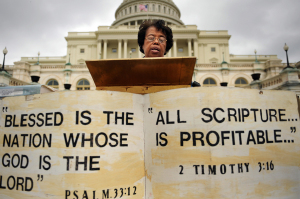Cancel culture and its antithesis: John Newton’s 'Amazing Grace'
John Newton got it right. He experienced it. He celebrated it. The grace of God is amazing!
He wrote an entire hymn about it.
“A lost and blind wretch?”
Most of us know the story. The beloved hymn, commonly known as “Amazing Grace,” was written by a former slave ship captain and slave trader, John Newton. Once he became a believer in Jesus Christ, he became a changed man, and later abandoned slave trade.
Referring to his past, he was quoted as saying, “I had the ambition of a Caesar or an Alexander, and wanted to rank in wickedness among the foremost of the human race.” He also claimed he was, “a ringleader in blasphemy, and wickedness.”
Newton realized the severity of his cruel, ungodly past. He did not think he merited forgiveness; in his mind, his crime against fellow humans he transported in his ships as slaves for many years was undeserving of forgiveness by even the most forgiving humans. He was convinced, he was an unforgivable racist wretch, who was lost and blind. This is how he presented himself in his autobiographical hymn, “Amazing Grace”:
Amazing Grace, how sweet the sound
That saved a wretch like me
I once was lost, but now am found
Was blind but now I see
In March 1748, during a return voyage to England, faced with potential death in a likely sinking ship, while battered by a fierce storm off the coast of Ireland, he pleaded for God’s mercy, repented of his sins and believed in Jesus Christ. Speaking of that very moment, he said in his famous hymn, “How precious did that grace appear the hour I first believed.”
He tasted the Amazing Grace of God
He found the access to the unlimited amazing grace of God through Jesus Christ, and he took it by faith.
He is quoted as saying, “Yet, though I am not what I ought to be, nor what I wish to be, nor what I hope to be, I can truly say, I am not what I once was; a slave to sin and Satan; and I can heartily join with the apostle, and acknowledge, ‘By the grace of God I am what I am.’”
In his thirties he became an ordained minister in the Church of England; for decades he served as a prominent pastor, as a writer, and as a respected Christian leader, all by the grace of God. He also devoted his efforts towards correcting a national blemish called, slave trade, permitted by the laws of his nation, Britain. He was not satisfied with turning his back to captaining slave ships and profiting from slave trade. He wanted to bring about a total end to all slave trade by the British; it needed an Act of the mighty British Parliament in the late eighteenth century.
Newton was NOT canceled
Newton said his past was blatantly selfish and racist. But he was not “canceled,” as we know it today.
After ditching his past and experiencing total redemption from his past sins by the amazing grace of God, history records that, as an ordained minister, he worked for decades alongside well-known abolitionist William Wilberforce, a Member of the British Parliament, to successfully end British slave trade by a new law passed by the Parliament in 1807; he died later that year, obviously satisfied with the fruition of his collaborative efforts, and the end of slave trade by the British. This was a rare redeeming accomplishment for a former slave ship captain and slave trader.
Because he was not canceled for his past sins, Newton was able to spend his life productively writing books and hymns, pastoring a church congregation, and banishing slave trade, among other Christian ministries.
He gave us the beloved “Amazing Grace” hymn to sing and remind ourselves, again and again, the grace of God that was sufficient even for the captain of a slave ship to reconcile with God. He was not the only one in need of God’s abundant grace, we all do.
The depiction of God’s amazing grace in Newton’s hymn is passionately sung by people of all races in all continents. Hear this rendition of “Amazing Grace” by legendary operatic soprano Jessye Norman, on June 11, 1988 before an audience of 70,000 at the Wembly stadium, London, UK; Newton could not have imagined a better rendition, when he wrote the hymn. Given Newton’s past ties to slave ships, this rendition of “Amazing Grace” celebrating divine grace by none other than Jessye Norman, who is black, is a fitting tribute to the author as well as the operatic singer.
John Newton’s life, in its entirety, together with his autobiographical “Amazing Grace,” offers us the best reason to boot the pesky cancel culture.
Paul Swamidass, PhD, is Professor Emeritus, Harbert College of Business, Auburn University, Auburn, AL, USA. After a total of 33 years of teaching and publishing as a business management professor, he retired from Auburn University in 2016 after teaching there for 24 years. He teaches Biblical Leadership for Kerusso Institute for Global Leadership. His newest book is, Greater Things: The Qualifications of a Biblical Leader, Vide Press, 2020. He and his wife Nimmi worship at Lakeview Baptist Church, Auburn, AL.



























